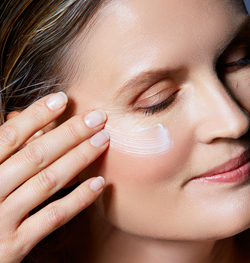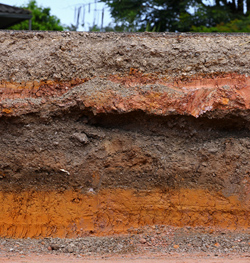You’ll have noticed that collagen boosting products and ingredients are considered to be a good thing. But what is really going on with collagen boosting products and can we, by understanding it better, be surer to target the ones that are really likely to work?
Collagen and skin
Collagen is the main structural protein of connective tissues and makes up from 25% to 35% of the protein content in our bodies. Collagen, in the form of elongated fibrils, is mostly found in fibrous tissues such as tendons, ligaments and skin.
You might have noticed that high tech potions and lotions claim to reach the fibroblasts. This is important because a fibroblast is a type of cell that synthesizes the extracellular matrix and collagen.
Possessing great tensile strength, collagen functions in a manner that is very different from many other types of proteins. For example, it can be found both inside and outside of cells. Collagen gives the skin its strength and elasticity, and is also responsible for the replacement of dead skin cells.
Basically, collagen is one of the body’s key natural resources, so it’s unfortunate that collagen production typically begins to decline after the age of 40. When collagen breaks down, your skin becomes weaker, and this can lead to sagging.
So what can we do to prevent this, or at least ameliorate it? Slapping collagen on your skin won’t help. Collagen molecules are too large to be absorbed through the skin. Collagen dressings attract new skin cells to wound sites. A study on rats concluded that topical application of collagen did not facilitate wound healing.
However, now that we understand more about collagen, we can make some more educated stabs at how to replenish our stocks.
Amino acids – especially proline
A good place to start is by appreciating that collagen is comprised of amino acids, especially proline, hydroxyproline, and glycine. And if you want to hone in on just one, know that a good proportion of collagen is made up of the amino acid proline. Proline is a major component of connective tissue and has the ability to strengthen and renew aging skin cells. One-sixth of collagen is comprised of proline.
Proline is in Deciem NIOD Hydration Vaccine ($55 in the shop).
There's a double whammy with Sciote Vitamin C Eye Treatment ($70 in the shop), which has vitamin C (see below) and tons of amino acids. Those amino acids also feature prominently in Sciote's Peptide + Defense Firming Youth Serum ($115 in the shop).
Vitamin C
Vitamin C is a co-factor with several amino acids for the synthesis of collagen. Indeed a deficiency in vitamin C will result in destroyed collagen. So a good vitamin C serum will help boost collagen.
Transderma C ($175 in the shop) is almost nothing but C and it has a unique waterless base. There's Sciote Vitamin C Eye Treatment ($70 in the shop), while Your Best Face Advanced CE Concentrate ($50 in the shop) has a great quality to price ratio with no less than three forms of vitamin C, amounting to a concentration of 8.7%.
Dr. Dennis Gross is a big vitamin C proponent on the grounds that it is the only antioxidant that also produces collagen. As well as vitt Camin C, his C+ Collagen Deep Cream ($72 in the shop) also has hydroxyproline and a collagen amino acid complex as does Dr. Dennis Gross C+ Collagen Brighten and Firm Vitamin C Serum ($78 in the shop).
Ultrasound
Our recent clinical trials for Truth Vitality Lux Renew showed that 88.9% of subjects using ultrasound showed improvement in collagen. Ultrasound vibrations (which are subsensory) oscillate the tissue and cause movement of fluid waves against cells. This facilitates movement between the inner and outer cells and thereby increases fibroblastic activity and collagen formation.
Ultrasound is combined with LED light on my FDA cleared Truth Vitality Lux Renew ($279 in the shop).
Copper peptides
Not only do copper peptides promote collagen, they actually remove any that is damaged. Copper is the key mineral in lysyl oxidase, an enzyme that weaves together collagen and elastin.
Research has shown that copper peptides and red LED light make a powerful combination. Red light alone maintains fibroblast activity and increases collagen synthesis. When used with copper peptides, collagen 1 expression increases even more. So use a copper peptide based serum with the red LED light feature of True Vitality Lux Renew.
Ao Skincare Peak Strength AM Serum-Shot ($85 in the shop) has vitamin C and a copper peptide, as well as a growth factor and spin traps. Another interesting formula is stem cell based Keracell Re-Cu-perate Recovery Serum ($120 in the shop).
Benir Beauty BV Nine Platinum Anti-Aging Bee Venom Cream ($136 in the shop) uses copper peptides and bee venom to encourage collagen production, while simultaneously delivering antioxidants.
Matrixyl 3000 and ‘Synthe 6
Matrixyl 3000 is a proven skin improver. There’s no independent research on its collagen boosting prowess, but there is plenty of anecdotal evidence justifying this ingredient as the mainstay of any serious serum. There’s also the newer Matrixyl Synthe’6 and it works on collagens I, III and IV.
You’ll find them both in Your Best Face Correct ($150 in the shop) and Your Best Face Control ($160 in the shop), ExPürtise Effective Anti-Aging Face Serum ($120 in tte shop), ReLuma Eye Cream ($95 in the shop).
Far Infrared Ceramic Powder
Far infrared waves are the longest rays in the light spectrum and easily absorbed by the body to a depth of up to 3 inches. There they can do useful things. Wound healing being one of them. Findings also revealed greater collagen regeneration and infiltration of fibroblasts that expressed transforming growth factor-(TGF-1).
This unusual ingredient is in E'shee Clinical Esthetic Elixir of Life KI Therapy Serum ($189 in the shop)
A word on supplements, chews, collagen drinks
A study on pigs' ingestion of collagen peptide showed that it induces increased fibroblast density and enhances formation of collagen fibrils in the dermis in a protein-specific manner. However, some of the research on collagen peptides has been conducted to support a patent for a product called Verisol. In 2013, the European Food Safety Authority reviewed Verisol and determined that there wasn’t enough evidence to support claims that it improves skin elasticity. I found only one study, conducted in Japan, that says that taking collagen supplements had a visibly positive effect on the skin.




















May 8, 2015
by Marta
Hi Carole, since you should use retinol only at night as it increases photosensitivity, the simplest would be to use Firewall in the mornings.
May 8, 2015
by Marta
Hi Ginger, I was going to include retinol on the grounds that there is the assumption that increased cell turnover boosts retinol. But when I started to do the research, I couldn't find any evidence that it works directly on collagen. Descriptions of how retinol works focus on its interactions with cells with no discussion of collagen. Since I wanted this article to focus on collagen and mechanisms directly related to it, not to mention the controversy and side effects involved in retinoids, I decided not to include them in this post.
May 8, 2015
by Carole
I purchased the Medik8 firewall, but I don't know how to incorporate in my routine. I use vitamin c & a retinol..... When do I use the Medik8?
May 7, 2015
by Ginger Berman
Hi Marta,
I thought retin-A was the gold standard for collagen production. Not true?
Ginger
May 7, 2015
by Marta
Hi Cherlyn - it would be a good idea to combine Ultrasound/LED with a good collagen boosting serum. But you don't necessarily need more than one serum. A good option, though, would be to use a vitamin C at night and which ever of the others that appeals in the morning.
May 7, 2015
by Cherlyn
Do you recommend using a combination of these products together to boost collagen?